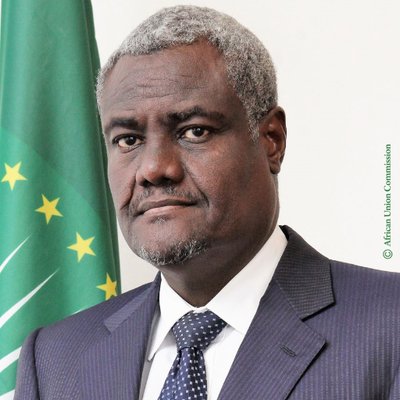Immigration
Between 400,000 and 700,000 African migrants in Libya: AU

Moussa Faki Mahamat stressed the urgency of removing the thousands of migrants, including women and children, from the camps as he addressed the summit where migration was a top issue after recent footage of a migrant slave auction in Libya drew global horror and condemnation. (Photo: Moussa Faki Mahamat/Twitter)
ABIDJAN, Cote d’Ivoire — Between 400,000 and 700,000 African migrants are living in camps in Libya, often under “inhuman” conditions, the chairman of the African Union Commission said Thursday at the close of a summit of European and African leaders.
Moussa Faki Mahamat stressed the urgency of removing the thousands of migrants, including women and children, from the camps as he addressed the summit where migration was a top issue after recent footage of a migrant slave auction in Libya drew global horror and condemnation.
At least 3,800 migrants in one camp in Tripoli need to be removed as soon as possible, Mahamat said. Most of them come from West Africa.
“That’s just one camp,” he said. “The Libyan government has told us there are 42,” and some contain an even larger number of migrants.
The International Organization for Migration says more than 423,000 migrants had been identified in the chaotic North African country as of last month. The majority are men from impoverished countries across sub-Saharan Africa.
In a communique Thursday, the European and African leaders agreed to “accelerate exponentially” efforts to repatriate the migrants and vowed to combat the crimes committed against them.
The leaders also pledged to do more to help the migrants stranded in squalid detention centres in Libya, the main jumping-off point for desperate people setting out in unseaworthy boats in search of better lives in Europe.
French President Emmanuel Macron said leaders from EU and African countries, including Libya, and the United Nations were discussing going after human traffickers with “concrete, military and police actions on the ground to trace back these networks.”
“These smugglers are deeply linked to many terrorist networks and feed, sometimes finance, sometimes are the same as those who make war with us and who kill people every day in much of northern Africa,” Macron told French broadcasters France 24 and RFI.
Some African nations are working to bring their citizens home.
Nigerian President Muhammadu Buhari said Wednesday that all Nigerians stranded in Libya and other parts of the world will be brought home and “rehabilitated,” calling it appalling that “some Nigerians were being sold like goats for few dollars in Libya.”
Nigeria’s government said on Twitter that 242 Nigerian migrants returned home from Libya on Tuesday and that more than 4,000 stranded there have “safely retuned home” this year.
Ivory Coast’s government in the past week repatriated 316 citizens stranded in Libya.
Europe has struggled to slow the flow of tens of thousands of Africans making the dangerous crossing of the Mediterranean. European countries are trying to discourage the stream of migrants with development aid and other means, including funds to tighten border controls. But many Africans feel pressured to make the journey, risking death and abuse, saying high unemployment and climate change leave them little choice.
At least 3,000 drown or go missing annually in attempts to cross the Mediterranean, but with Africa’s population forecast to rise significantly in coming decades many more are likely to take the risk.
To focus efforts, the EU, the African Union and the United Nations also announced that they would set up a special task force to help protect migrants, notably those detained in conflict-torn Libya.
Details of its work must be fleshed out, but the main aim is to “save and protect lives of migrants and refugees along the routes and in particular inside Libya.”
The task force, which will work closely with Libyan authorities, will also try to speed up the process of returning willing migrants to their home countries and finding new homes for those fleeing violence or conflict and who need international protection.





















